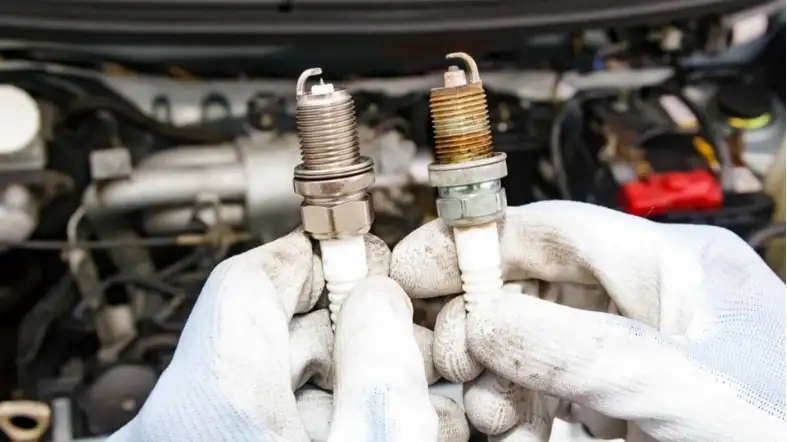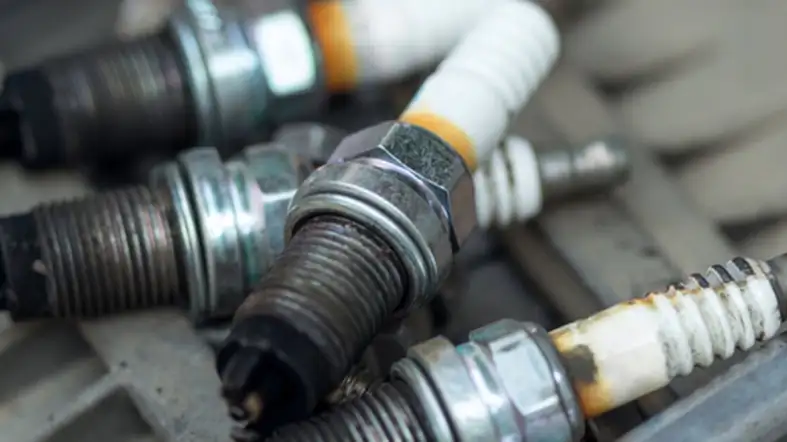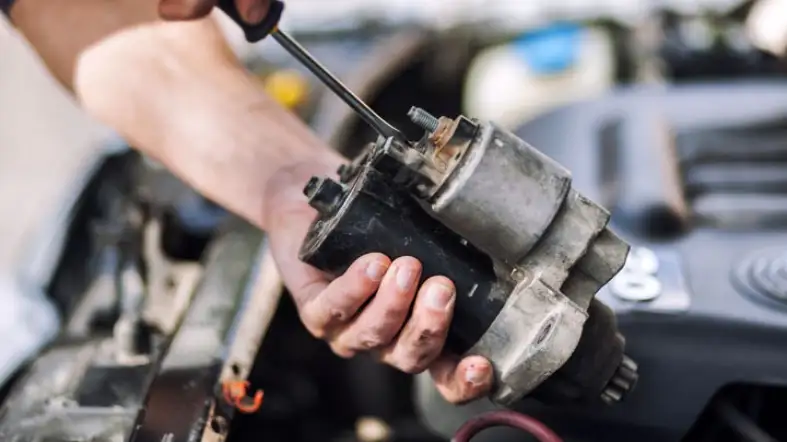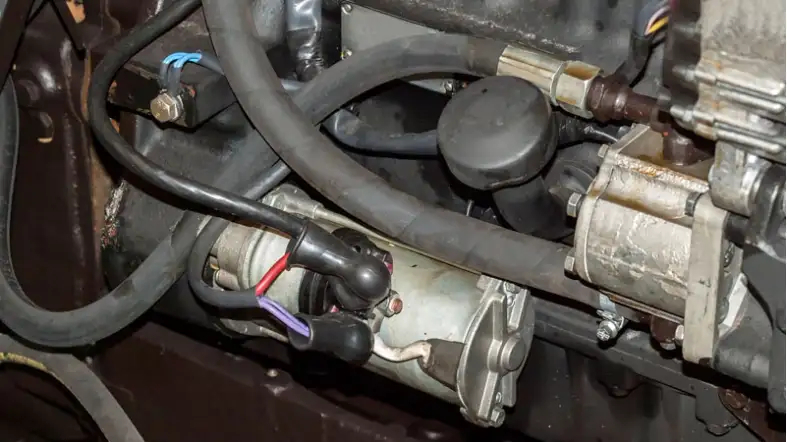Are you tired of your car not starting, despite your efforts to turn the key in the ignition?
Have you considered the possibility of a bad starter or spark plugs?
These two components are essential for starting a vehicle, but they can wear out over time, causing problems.
In this article, we will explore the causes, symptoms, and solutions for bad starters and spark plugs, providing you with valuable information to keep your car running smoothly.
Signs of Bad Starter: How to Tell if Your Starter is Failing?
Identifying a failing starter is crucial because it can prevent you from getting stranded on the road unexpectedly.

A failing starter can manifest in various ways, and it is essential to know how to recognize the signs.
Here are the indications of a bad starter and how to tell if your starter is failing.
Engine Cranks Slowly
If you turn the key, and the engine cranks slowly, or it takes longer than usual to start, it is a clear indication that your starter is failing.
You may also hear a clicking noise or a grinding noise when you try to start the engine.
No Noise
When you turn the Key If you turn the key, and there is no noise at all, it could be due to a dead battery or a bad starter.
You can check the battery by turning on the headlights, and if they are dim, then the battery is weak or dead.
If the headlights are bright, then it is most likely a bad starter.
Smoke or Burning Smell
If you notice smoke or a burning smell when you try to start the engine, it is a clear indication of a bad starter.
The starter motor may be overheating due to electrical problems, causing the insulation to melt and produce smoke or a burning smell.
Electrical Problems
A bad starter can cause various electrical problems in your car.
You may notice that your lights are dim, or your radio and other electronic devices are not working correctly.
This could be due to a lack of power to the electrical system caused by a bad starter.
Freewheeling
If you hear a high-pitched whine or a spinning noise when you turn the key, it could be due to freewheeling.
Freewheeling happens when the starter engages but does not turn the engine over. This is a clear indication of a bad starter.
Symptoms of Bad Spark Plugs: How to Diagnose Spark Plug Problems

Spark plugs play a crucial role in your car’s engine performance, and when they fail, they can cause various issues.
Below are the symptoms of bad spark plugs and how to diagnose spark plug problems.
Misfiring Engine
A misfiring engine is one of the most apparent signs of bad spark plugs.
When a spark plug is not functioning correctly, it can cause the engine to misfire, resulting in a rough idle or stalling.
You may also notice a loss of power when accelerating.
Poor Fuel Economy
Bad spark plugs can cause your car’s fuel economy to suffer.
When the spark plugs are not functioning correctly, it can lead to incomplete combustion, resulting in wasted fuel.
If you notice a significant decrease in your car’s gas mileage, it could be due to bad spark plugs.
Difficulty Starting the Engine
If your car is having trouble starting, it could be due to bad spark plugs.
When the spark plugs are not functioning correctly, they may not be able to ignite the fuel in the engine, making it difficult to start the car.
You may also notice that the engine cranks for longer than usual before starting.
Engine Vibrations
Bad spark plugs can cause engine vibrations, which can feel like shaking or roughness.
When a spark plug is not firing correctly, it can cause the engine to run unevenly, leading to vibrations.
You may also notice that your car is louder than usual when idling.
Poor Acceleration
If your car is not accelerating as it should, it could be due to bad spark plugs.
When the spark plugs are not functioning correctly, they can cause a loss of power and slow acceleration.
You may also notice that the car feels sluggish or unresponsive when you try to accelerate.
Effects of Bad Starter: How a Failing Starter Affects Your Car?

A starter is a critical component of your car’s engine, responsible for starting the engine.
When the starter begins to fail, it can cause various issues that can affect your car’s overall performance.
Here are the effects of a bad starter and how a failing starter affects your car.
Difficulty Starting the Engine
When the starter fails, it may not be able to provide enough power to turn the engine over, resulting in slow or no cranking.
This can make it difficult or impossible to start your car.
Engine Stalling
A failing starter can cause your engine to stall while driving.
If the starter is not providing enough power to the engine, it may not be able to keep the engine running, resulting in a stall.
This can be dangerous, especially if it happens while driving at high speeds.
Clicking or Grinding Noise
If you hear a clicking or grinding noise when you try to start your car, it could be due to a failing starter.
The clicking noise is usually a sign that the starter motor is not engaging correctly, while the grinding noise could be due to worn-out gears in the starter.
Battery Drain
A bad starter can cause your car’s battery to drain quickly. When the starter is failing, it may continue to draw power from the battery even after the engine has started.
This can cause the battery to die quickly, leaving you stranded.
Electrical Issues
A failing starter can cause various electrical issues in your car.
For example, it may cause the lights to dim or flicker, or the radio and other electronic devices may not work correctly.
This is usually due to a lack of power to the electrical system caused by a bad starter.
Effects of Bad Spark Plugs: How Bad Spark Plugs Affect Engine Performance?
Spark plugs are an essential component of your car’s engine, responsible for igniting the fuel and air mixture in the combustion chamber.
When the spark plugs are bad, they can cause various issues that can affect your car’s overall performance.
Below are the effects of bad spark plugs and how they can affect the engine performance.
Decreased Engine Performance
Bad spark plugs can cause a decrease in engine performance, resulting in a sluggish or unresponsive engine.
When the spark plugs are not functioning correctly, they may not be able to ignite the fuel and air mixture effectively, leading to incomplete combustion.
This can cause a decrease in power and acceleration.
Rough Idle
If your car has bad spark plugs, you may notice a rough or uneven idle.
When the spark plugs are not firing correctly, it can cause the engine to run unevenly, resulting in a rough idle.
You may also notice vibrations or shaking when idling.
Difficult Starting
Bad spark plugs can make it difficult to start your car. When the spark plugs are not functioning correctly, they may not be able to ignite the fuel and air mixture, making it difficult to start the engine.
You may also notice that the engine cranks for longer than usual before starting.
Poor Fuel Economy
Bad spark plugs can cause your car’s fuel economy to suffer.
When the spark plugs are not functioning correctly, they may not be able to ignite the fuel and air mixture effectively, resulting in incomplete combustion.
This can cause your car to use more fuel than usual, leading to poor gas mileage.
Engine Misfires
If your car has bad spark plugs, it may experience engine misfires.
When the spark plugs are not firing correctly, it can cause the engine to misfire, resulting in a loss of power, a rough idle, or stalling.
Engine misfires can also cause damage to the catalytic converter and other components of the engine.
Causes of Bad Starter: Why Your Starter is Failing?

A starter is a critical component of your car’s engine, responsible for starting the engine.
When the starter fails, it can cause various issues that can affect your car’s overall performance.
Below are the causes of a bad starter and why your starter may be failing.
Wear and Tear
The most common cause of a bad starter is wear and tear. Over time, the starter’s components, such as the gears, bearings, and brushes, can wear down and fail.
This can cause the starter to malfunction or fail altogether.
Electrical Problems
A bad starter can also be caused by electrical problems. If the starter’s electrical connections are loose, corroded, or damaged, it can cause the starter to malfunction or fail.
Electrical problems can also cause the starter motor to overheat, leading to damage and failure.
Faulty Solenoid
The solenoid is another critical component of the starter, responsible for engaging the starter motor.
If the solenoid is faulty or damaged, it may not be able to engage the starter motor correctly, causing the starter to malfunction or fail.
Faulty Ignition Switch
A faulty ignition switch can also cause a bad starter. If the ignition switch is not sending the correct signals to the starter, it may not be able to start the engine.
This can cause the starter to malfunction or fail.
Extreme Temperatures
Extreme temperatures can also cause a bad starter. When the starter is exposed to extreme heat or cold, it can cause the components to expand or contract, leading to damage and failure.
Extreme temperatures can also cause the starter motor to overheat, leading to damage and failure.
Causes of Bad Spark Plugs: Common Reasons for Spark Plug Failure?
Spark plugs are an essential component of your car’s engine, responsible for igniting the fuel and air mixture in the combustion chamber.
When the spark plugs fail, they can cause various issues that can affect your car’s overall performance.
Below are common causes of bad spark plugs and why they may fail.
Normal Wear and Tear
The most common cause of bad spark plugs is normal wear and tear.
Over time, the spark plug’s electrodes can wear down, causing them to become less effective at igniting the fuel and air mixture.
This can cause a decrease in engine performance, poor fuel economy, and other issues.
Fouling
Fouling is another common cause of bad spark plugs.
Fouling occurs when deposits, such as oil, fuel, or carbon, build upon the spark plug’s electrodes, preventing them from firing correctly.
This can cause a decrease in engine performance, misfires, and other issues.
Overheating
Spark plugs can also fail due to overheating. When the engine is running at high temperatures, it can cause the spark plugs to overheat, leading to damage and failure.
Overheating can be caused by a variety of factors, including a lean fuel mixture, advanced ignition timing, and other issues.
Incorrect Gap
The spark plug gap is the distance between the electrodes, and it plays a crucial role in igniting the fuel and air mixture.
If the gap is too large or too small, it can cause the spark plugs to fail. This can be caused by improper installation or wear and tear.
Electrical Problems
If the ignition system is not functioning correctly, it may not be able to provide enough power to the spark plugs, causing them to fail.
Electrical problems can also cause the spark plugs to misfire or not fire at all.
Prevention Tips: How to Avoid Starter and Spark Plug Problems?
Starter and spark plug problems can cause various issues that can affect your car’s overall performance.
While these issues are common, they can often be prevented with proper maintenance and care.
Below are some prevention tips to help you avoid starter and spark plug problems.
Regular Maintenance
One of the best ways to prevent starter and spark plug problems is by performing regular maintenance on your car.
This includes changing the oil, air filter, and fuel filter regularly, as well as checking the battery and electrical system.
Regular maintenance can help ensure that your car’s engine is running smoothly and prevent issues with the starter and spark plugs.
Use Quality Parts
Using quality parts is another way to prevent starter and spark plug problems.
It is essential to use the manufacturer-recommended spark plugs and starters for your car.
Cheap or inferior quality parts may not function correctly or wear out quickly, leading to issues with the starter and spark plugs.
Avoid Overheating
Overheating can cause various issues with your car’s engine, including problems with the starter and spark plugs.
To avoid overheating, make sure that your car’s cooling system is functioning correctly.
This includes checking the coolant levels and ensuring that the radiator and cooling fans are working correctly.
Drive Responsibly
Driving responsibly can also help prevent starter and spark plug problems.
Avoid harsh acceleration and sudden stops, as this can cause excessive wear and tear on the starter and spark plugs.
It is also essential to avoid overloading your car, as this can cause the engine to work harder and lead to starter and spark plug issues.
Address Issues Promptly
Finally, addressing issues promptly is crucial to preventing starter and spark plug problems.
If you notice any signs of starter or spark plug issues, such as difficulty starting, misfires, or poor engine performance, take your car to a mechanic as soon as possible to diagnose and fix the problem.
Replacement Guide: How to Replace Your Starter and Spark Plugs?
Replacing the starter and spark plugs is an essential part of maintaining your car’s engine.
While these tasks may seem daunting, they can be completed with the right tools and some basic knowledge.
Below, we will provide a guide on how to replace your starter and spark plugs.
How to Replace Your Starter
- Disconnect the Battery: Before starting the replacement process, it is essential to disconnect the battery to prevent any electrical shocks or accidents.
- Locate the Starter: Locate the starter under the hood of your car. The starter is typically located near the engine, and it is connected to the transmission or flywheel.
- Remove the Connections: Remove the connections from the starter, including the positive and negative cables, as well as any other wires connected to the starter.
- Remove the Starter: Remove the bolts that hold the starter in place, and carefully remove the starter from the engine compartment.
- Install the New Starter: Install the new starter in the same position as the old one, and secure it with bolts. Reconnect the positive and negative cables and any other wires that were connected to the old starter.
- Reconnect the Battery: Finally, reconnect the battery and start the engine to ensure that the new starter is working correctly.
How to Replace Your Spark Plugs
- Locate the Spark Plugs: Locate the spark plugs under the hood of your car. The spark plugs are typically located near the engine block, and there will be one for each cylinder.
- Remove the Old Spark Plugs: Using a spark plug socket, remove the old spark plugs from the engine. Be sure to remove one at a time to avoid confusion.
- Check the Gap: Check the gap on the new spark plugs using a feeler gauge to ensure that they are correctly set for your car’s engine.
- Install the New Spark Plugs: Install the new spark plugs in the same position as the old ones, and tighten them with the spark plug socket.
- Reconnect the Ignition Wires: Reconnect the ignition wires to the new spark plugs in the correct order, following the manufacturer’s instructions.
- Test the New Spark Plugs: Finally, start the engine to ensure that the new spark plugs are working correctly. Listen for any misfires or unusual sounds, and check the engine’s performance to ensure that it is running smoothly.
FAQs
Q. Can A Bad Starter Damage The Engine?
A: A bad starter can cause damage to the engine if left unchecked.
If the starter is continuously cranking the engine without starting, it can cause damage to the engine’s internal components, such as the bearings and crankshaft.
Q. How Often Should Spark Plugs Be Replaced?
A: The replacement interval for spark plugs varies depending on the make and model of your car.
Generally, spark plugs should be replaced every 30,000-100,000 miles, depending on the type of spark plugs used and the driving conditions.
Q. How Can I Tell If My Car’s Starter Or Spark Plugs Are The Problems?
A: If your car has trouble starting, it can be challenging to determine if the starter or spark plugs are the problem.
However, if the engine cranks but doesn’t start, it could be a spark plug issue.
If there is a clicking sound when trying to start the engine, it could be a starter issue.
Q. How Much Does It Cost To Replace A Starter Or Spark Plug?
A: The cost of replacing a starter or spark plugs varies depending on the make and model of your car, as well as the cost of parts and labor.
Generally, replacing a starter or spark plugs can cost anywhere from $100-$500, depending on the complexity of the job.
Final Words
A bad starter or spark plugs can be a frustrating issue for any vehicle owner, causing delays and inconvenience.
However, by understanding the symptoms and causes of these problems, you can take proactive steps to address them before they become major issues.
Regular maintenance, such as replacing spark plugs, can prevent these problems from occurring in the first place.
If you suspect a bad starter or spark plugs, it’s best to have a professional mechanic diagnose and fix the problem to ensure your car stays in top working condition.
Remember, with proper care and attention, your vehicle can provide you with reliable transportation for many years to come.
